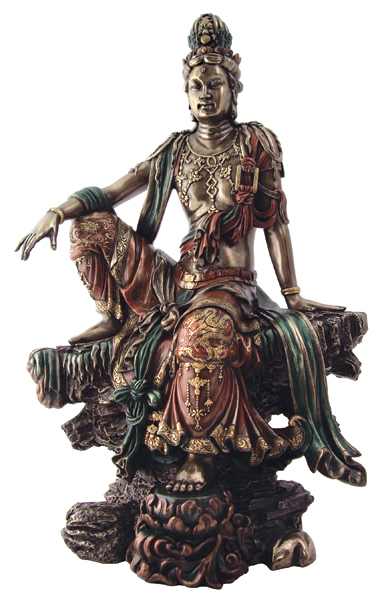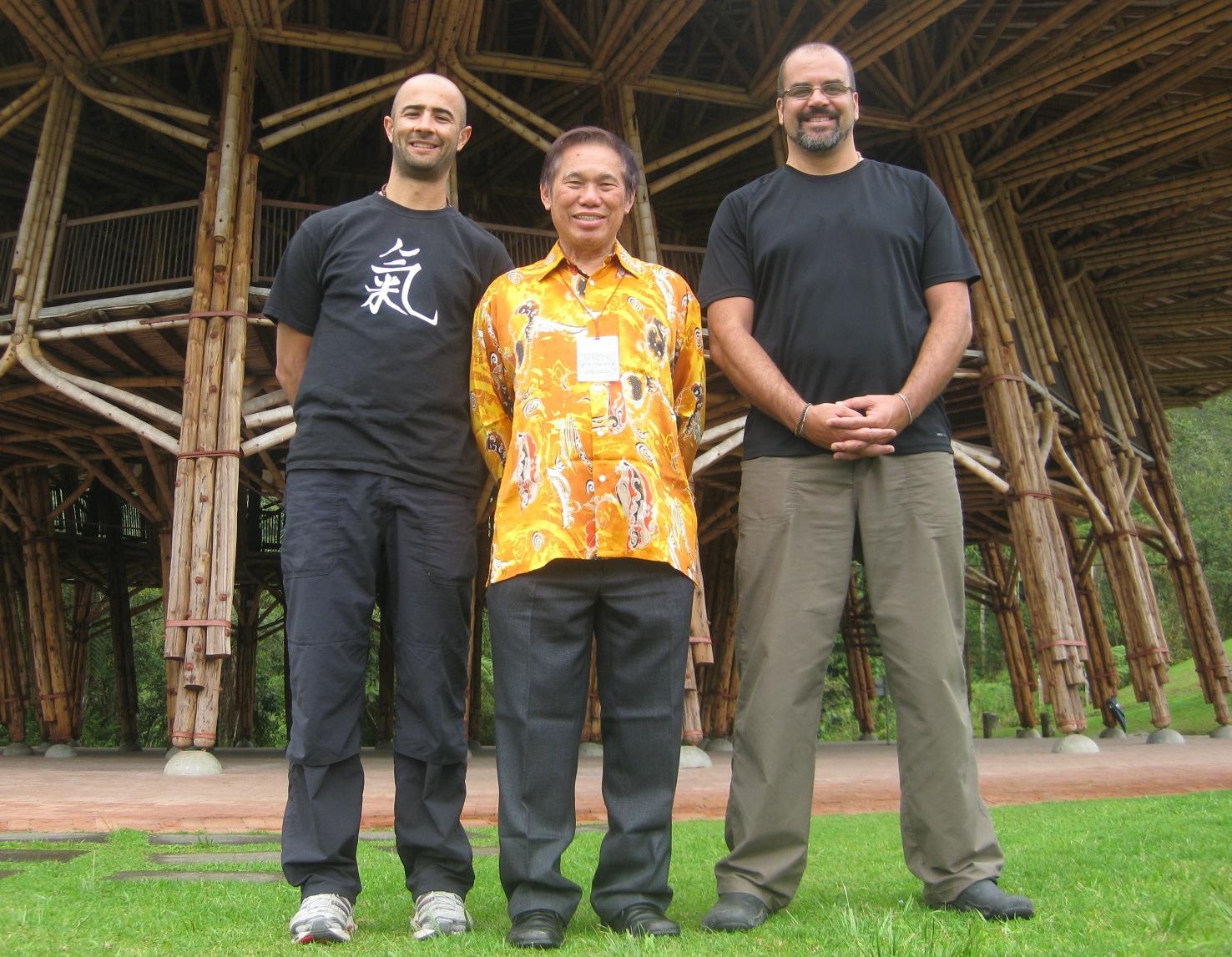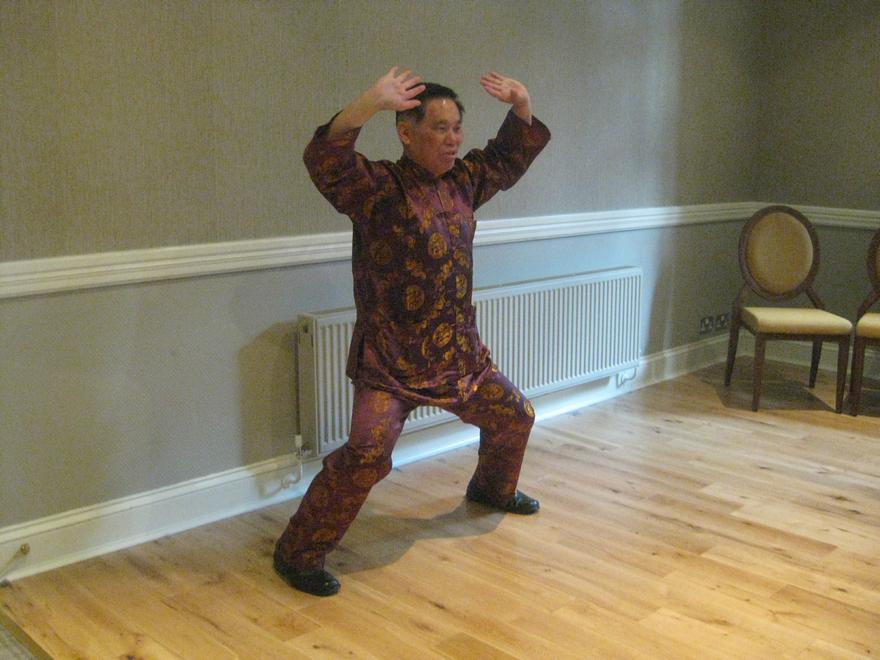SELECTION OF QUESTIONS AND ANSWERS
JUNE 2013 PART 2

The Great Bodhisattva Guan Yin
Question 1
In this life I want to dedicate my time to becoming a Bodhisattva.
— Jordan, USA
Answer
The two-fold guiding principle of a Bodhisattva is "seong kow fat fatt, ha tou chong sang" which is in Chinese (Cantonese) meaning "Upward, aim to attain Buddhahood: downward strive to help sentient beings".
This is exactly what we do in our school, though we are in no hurry to achieve Buddhahood in this life-time. It is pertinent to note that our teaching and practice are categorically non-religious, and that "Buddhahood", which is a literal translation from the Chinese quotation above, means returning to God the Holy Spirit, attaining the Tao or merging with the Supreme Reality.
All our training, right from the beginning to the most advanced, is triple cultivation of body, energy and spirit. We cultivate to have a healthy body, to have a lot of energy for work and play, and to purify our spirit to appreciate beauty in this world as well as to have wisdom about eternal life. Our training is not just theoretical, but practical, we directly experience what we train for.
We help other people irrespective of race, culture and religion. We have helped literally thousands of people recover from so-called incurable diseases. We openly share secrets with chi kung practitioners and martial artists of other schools, secrets that past masters kept only for their very special disciples. We give free advice to sincere seekers to improve their personal, family, social and professional performance and happiness. We give health and happiness to people.
Nevertheless, it is important to bear in mind that ours is basically a chi kung and kungfu school, and not a retreat centre to cultivate for an afterlive. While we have knowledge of the afterlife, and in fact have spiritual experiences like expanding beyond our physical body that even cloistered monks may not have, our concern is more on living a meaningful, rewarding life here and now than on what heaven is like in future.
In practical terms, we prefer enjoying our work as well as meat and wine to chanting prayers and sustaining on a vegetarian diet. This does not mean we do not care for our future. We do, and we know we shall go to heaven when the time comes or attain the supreme spiritual achievement, as we avoid evil, do good and cultivate our mind, precisely as Bodhisattvas do.
Question 2
I have read your book "The Complete Book of Zen", which you prescribe a Shaolin system, your recommended system, to dissolving this illusion and realizing one's true nature. You recommend Shaolin Kung Fu, 18 Lohan Hands and Sinew Metamorphosis, and Meditation.
It is my understanding that the Shaolin Kung Fu, 18 Lohan Hands and Sinew Metamorphosis is to make the physical body healthy and full of vitality, quiet the mind, control the emotions, and increase one's vibration and energy so they may enter and begin meditation. Is my understanding true?
Answer
Your understanding is only partially right, but mainly wrong.
We practice our arts for present needs rather than for future expectations. Those who are sick and in pain, become healthy and pain free. Those who are weak and lifeless, become strong and full of vitality. Those who are emotionally agitated become peaceful and happy. Those who are stressful and dull become relaxed and mentally fresh. Those who are already healthy find life a joy.
Meditation, in the sense of seated in a lotus position, is not normally practiced in our school. But every practice in our school is a practice of meditation, in the sense of training the spirit or mind.

A life full of joy
Question 3
Also, may you make a personal recommendation to me, of a specific program you would prescribe to me (whether it is learning directly from you or from Gusty), knowing I want to begin the path and process of becoming a Bodhisattva in this life? I am willing to dedicate my time in this life, I just am seeking the proper guidance.
Answer
If your concept of being, not just becoming, a Bodhisattva in this life is aiming for the highest spiritual cultivation while simultaneously helping other people, learning from Gusty, or any of our certified instructors, or from me, and daily practicing what you have learned is the right course of action.
Before even thinking of helping others, you yourself must be healthy and strong. It is sad and ironical to see many people, especially in Western societies where they don't have to work for a living, thinking of saving the world when they themselves need help.
You must also have something worthwhile to offer if you want to help others. Merely have good intentions is not enough. An excellent avenue is to become a Shaolin Wahnam chi kung healer to help others recover from so-called incurable diseases.
But first of all you yourself must be healthy and strong. If you are nervous and unhappy yourself, you must overcome these negative emotions first. You must be confident and happy, and then excel in chi kung healing before helping others.
But if your concept of becoming a Bodhisattva is different, like being housed and fed by others so that you can spend your time in a seated lotus position to mediate and then hopefully wandering about in heavens, our school is not a right place for you.
Question 4
You have mentioned that the last thought is very important in deciding where a person would go to when he leaves this life. Can you please elaborate on this?
— Gretel, Germany
Answer
Yes, there are three factors which determine where a soul would go to when he leaves this physical world. The three factors ate
- his last thought
- his developmental stage
- his karma
If he has cultivated spiritually, has good karma, and thinks of happy things, his soul is very likely to be reborn in heaven. If he is spiritually lost, has bad karma, and harbours evil thoughts at the time of his passing, he is likely to be reborn in hell or a lower realm.
The second important factor is the developmental stage of his spirit, sometimes referred to as the soul, heart, mind or consciousness in different cultures. If his spirit is calm and peaceful and he has knowledge of life beyond this world, he has attained a reasonably high level of spiritual development. If he is often angry and malicious, and does not believe in the after-world, he will be spiritually lost when he leaves this life.
The third important factor is karma, which means cause and effect. Karma is caused by three factors, namely thought, speech and action in that order of importance. To have good karma, it is not necessarily just to act well, but also to have good speech and good thought.
Karma, however, is not fixed. If a person has built up very bad karma in the past, if he makes a change now, he can gradually turn his bad karma to good karma. The most important factor for change is thought. Hence, we should have noble thought all the time.

A picture of paradise reproduced from http://www.mauiarts.com/Gallery-2005/Paradise-Found.htm. Where a soul will go to depends on three factors.
Question 5
You mentioned that it was important to practice at a safe place. I believe that besides being physical, a safe place can also refer to social conditions. This is particularly important to me because when I had my chi flow, on-lookers commented that I was wired. Can you please elaborate?
— Mariasita, Colombia
Answer
It is important to practice at a physical safe place, like away from high windows, high balconies, and glass planes. If you practice outside avoid places with deep drains.
It is also important to practice at a socially safe place where you will not be disturbed or negatively commented on, especially when you are new to chi kung. Initially it is advisable to practice in your own garden or house instead of in public.
However, as you have become less self-conscious, you may practice in a public place. It is a good way to overcome your own inhibitions. Often it is your own inhibitions rather than other people's curiosity that troubles you. Other people are usually too involved in their own business to pay attention to your chi kung practice.
However, if your chi flow movements are strange or noisy, it is advisable to control them, not because of your inhibitions but because of your consideration for other people.
It is similar in principle to taking alcohol or cigarettes. At first you are addicted to alcohol or cigarettes, and you have to take them even when you don't like them. As a result of your chi kung training, you overcome the addiction. Then, if you like, you may enjoy a drink or smoke. This time you do so not because you have to but because you like it.
Question 6
Sifu, what is the difference between "as a matter of course", as you mentioned, and "as a matter of fact"?
— Andreas, Colombia
Answer
As a matter of course refers to a course of action, whereas as a matter of fact refers to a statement of fact. The former is dynamic, whereas the latter is static.
For example, you travel from Bogota to Medellin. If you follow this course of action, you will arrive at Medellin. Arriving at Medellin is a matter of course.
Suppose you stopped half-way, or turned into another road leading to another town. The course you first took should lead you to Medellin. As a matter of course you should arrived at Medellin. But as a matter of fact, you did not arrive, you landed somewhere else.
This is the same as someone practicing chi kung to overcome an illness. All illness is caused by energy blockage. Practicing chi kung generates an energy flow that will clear the blockage. As a matter of course, he should overcome his illness. But as matter of fact, he may not if he stopped his practice half-way or deviates from his practice.

Big Boss Lifts Bronze Vessel from the Eighteen-Lohan Art
Question 7
How do we choose which exercise to practice to get the best benefits?
— Carlos, Mexico
Answer
Your choice is based on a few factors like your needs, aspirations, developmental stage and sometimes your whims and fancies.
If you wish to overcome pain and illness, for example, you should choose exercises from the Eighteen Lohan Hands to generate a vigorous chi flow.
If you are already healthy but want mental clarity and a lot of energy for peak performance in both your work and play, you would choose exercises from the Eighteen-Lohan Art.
If you wish to experience meeting God or expanding into the Cosmos, you would choose powerful exercises from Sinew Metamorphosis.
Nevertheless, if you are not clear about the underlying philosophy in making a choice, just choose any exercise you like and follow the three golden rules of not worrying, not intellectualizing and enjoying your practice. Even if you don't make an excellent choice, so long as you follow the three golden rules, you will still have good results.
Generally you will get the best result by focusing on just one exercise per session. But if you like you may choose two or more exercises. Each session lasts about only 15 minutes at lower levels, and about 10 minutes at higher levels.
Some people, especially those who are used to practicing chi kung for an hour per session, may be surprised that our sessions last only 15 minutes, and only 10 minutes at higher levels. This is because our chi kung is powerful and we are skilful in our practice. Practicing for more than 15 minutes, unless one is already an advanced practitioner, may be over-training. However, if once a while you find that your session goes far beyond 15 minutes, it is alright.
It is logical that the more advanced a practitioner is, or the more advanced an exercise, the less time he would take to practice it. For example, if your colleague takes an hour to complete a job, but you are more skilful than he, you would take less than an hour to complete the same job. If a cyclist takes an hour to reach a destination, but your drive a car, you would arrive at the same destination in shorter time.
Today, many chi kung practitioner think that the more advanced an exercise, the more time it needs to practice it. This is because what they practice is not genuine chi kung but gentle physical exercise which gives the results of loosening joints and muscles though the skills may be different. So they wrongly measure progress by the time they put in, instead of by the type of results they get.
Question 8
In the meditation after the Cosmic Shower just now, I found I had no legs. Is this normal?
Answer
It is not usual, in the sense that it does not usually happen, but it is exceptionally good result, though it is not uncommon in our school.
In absolute reality, not only you have no legs, you have no body; you are just energy, or just consciousness. But in the phenomenal world where we normally exist, due to the limitation of our sense organs, we see ourselves as having a body.
In the meditation just now, you attained higher levels of consciousness where you experienced reality at a higher level. Hence, you found that you had no legs. Had you gone deeper, you would find that you had no body, that you were no where and everywhere, as some of your classmates experienced.
Putting it in the other perspective, the perspective from absolute reality as oppose to the phenomenal world, you were partially emancipated from your illusion of having a body. Had your emancipation been complete, you would find that you had no body.
Congratulations. You have done exceptionally well, considering that this is the first time you are learning from me!
LINKS
Selected Reading
- Development of Shaolin Kungfu
- The Teaching of Confucius and Zhang San Feng
- Taming the Tiger
- What Would You Do If An Opponent Holds Your Two Arms at Your Back?
- TIs Choy-Li-Fatt Unique or a Specialization within Southern Shaolin?
